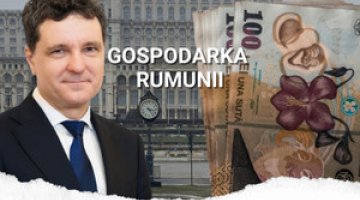The new ruling coalition in Romania
On 7 May the Romanian parliament approved the government of Victor Ponta by a clear majority of votes. This was formed by the Social-Liberal Union (USL) which until now has been in opposition. USL is likely to remain in power after the parliamentary election scheduled for November as it enjoys the support of 60% of society. The new camp has come to power following a wave of deep disappointment in society over budget cuts introduced by the outgoing centre-right coalition. The Ponta government will introduce modest fiscal loosening as it wishes to maintain close co-operation with the International Monetary Fund (IMF). Despite this, the new government will gradually increase salaries in the public sector and, being guided by a willingness to be different from their predecessors, will probably introduce a moratorium on the extraction of shale gas. The ruling coalition is also likely to attempt to launch an impeachment procedure of President Traian Basescu. Until the elections in November the Ponta government will not dedicate much attention to international issues but certain corrections of foreign policy should be expected.
The balance sheet of the centre-right's rule
The accession to power of the Social-Liberal Union (USL) calls an end to the nearly three-year rule of the centre-right coalition which was formed by the Democratic Liberal Party (PDL), the Democratic Union of Hungarians in Romania (UDMR) and the centre-left National Union for the Progress of Romania (UNPR). The centre-right coalition introduced one of the most restrictive austerity measures in the European Union. By means of decreasing salaries in the public sector by 25%, reducing numerous social benefits and increasing VAT from 19% to 24% the budget deficit was nearly halved within two years – from 9% of GDP in 2009 to 4.9% of GDP in 2011. However, those budget savings were made at the expense of living standards and the economic upturn came later than in other countries in the region (after 2009 and 2010 marked by the crisis, economic growth was recorded as late as in 2011 and stood at 1.7%). At the same time the centre-right government sought to introduce structural reforms required in order to obtain loans worth 25 billion euros in total, from the IMF, the World Bank and the EU. The government did not succeed in completing the healthcare system reform which sparked vehement social protests in January this year. The IMF still expects a number of state-owned companies to be privatised and energy prices on the internal market to be liberalised.
The policy of large budget cuts and the arbitrary way of pushing the reforms through without social dialogue have led to a substantial decline in the popularity of the ruling camp. PDL, which garnered over 32% of the vote in the election in 2008, now reaches at best 15% of support in opinion polls. One factor which has had a negative impact on popularity of the ruling coalition was the controversial privatisation of the extraction company Cupru Min Abrud and the fact that the government ignored the growing social resistance to concessions for the extraction of natural resources being given to foreign companies: shale gas (the American company Chevron) and gold (Rosia Montana Gold Corporation). The considerable decline in the support for PDL coupled with the prospect of losing the approaching local elections in June and the parliamentary election in November have accelerated the process of defections of PDL members of parliament to the opposition and the withdrawal of support for the government by independent MPs. This was the direct cause of the downfall of the government of Mihai Razvan Ungureanu.
The new government on a the collision course with the president
The Social-Liberal Union is composed of three parties – the post-communist Social Democratic Party (PSD), the centrist National Liberal Party (PNL) and the Conservative Party (PC). These parties have different political stances and what consolidates the coalition is the aversion of the leaders of USL to the centre right and President Basescu whose second term in office ends in 2014. The paramount demand put forward by USL is the impeachment of the president. Chances to dismiss the head of state are however slim as USL would have to build a qualified majority in parliament and then obtain support from 50% of those eligible to vote in the national referendum. Despite this USL may try to begin the impeachment procedure in order to consolidate and mobilise its electorate.
A difficult cohabitation may be expected also due to the position of the president. By starkly reviewing the government's work he will seek to increase the chances of the pro-presidential PDL and possibly other right-wing parties winning the November parliamentary election. It would be even more the case if the outgoing prime minister, Ungureanu, decided to establish a new centre-right party. Although the disintegration of the ruling USL in the forthcoming months is quite unlikely, the president will use differences between the coalition parties and try to prepare the ground for a shift in the ruling coalition (e.g. the recreation of the grand coalition between PSD and PDL which functioned for a short time in 2009).
The prospects of changes in foreign policy
Despite the predicted conflict with the president, the new centre-left government will not back off from the main orientations in foreign and security policies. There is consensus among the Romanian political elite that the strategic partnership with the US and strong involvement within NATO should be maintained. What also confirms the continuation of the European policy is the fact that the Chamber of Deputies has ratified the fiscal compact and that the former European Commissioner, Leonard Orban, has been appointed Minister of European Affairs; he also held this position in the centre-right government. Orban will guarantee continuity in the negotiations of the multiannual financial framework and in efforts to increase the absorption of European funds. The Ponta government has also announced it will continue supporting Moldova's European ambitions. However, the USL government will probably make an attempt to seek rapprochement with Russia. A member of the post-communist PDS has been appointed the head of diplomacy; this party traditionally displays a greater readiness to solve delicate historical issues and an openness to Russian investments. It is also possible that Romanian-Hungarian relations will cool because the party representing the Hungarian minority in Romania will for the first time in years not be part of the government. Furthermore, the opposition in the last months has not hesitated to use the issue of the Hungarian minority in its attacks against the centre-right government and criticised President Basescu's good relations with the Hungarian president Viktor Orban.
The prospects of changes in the economic policy
Right after the fall of the Ungureanu government, USL softened its populist rhetoric and decided that its priority was to maintain co-operation with the IMF. The new government has announced that it will carry on the privatisation process and release energy prices. However, the Ponta government has been granted the IMF's consent to increase salaries in the public sector by 8% from June this year and declared there will be another increase in salaries towards the end of the year. These moves should not lead to an important budget deficit (which is estimated to rise from 1.9% of GDP to 2.3% of GDP this year). The new government will take measures which will enhance its social support but will not lead to a radical modification of the premises of the economic policy. One such measure will be the already announced moratorium on the extraction of shale gas, an increase in fees for the exploitation of mines and an increase in taxes on the richest. However, should the results of opinion polls for USL prove to be poor, it cannot be ruled out that the fiscal policy will be further relaxed, which could affect Romania's credibility to pay off its loans and have a negative impact on the country's co-operation with the IMF.





